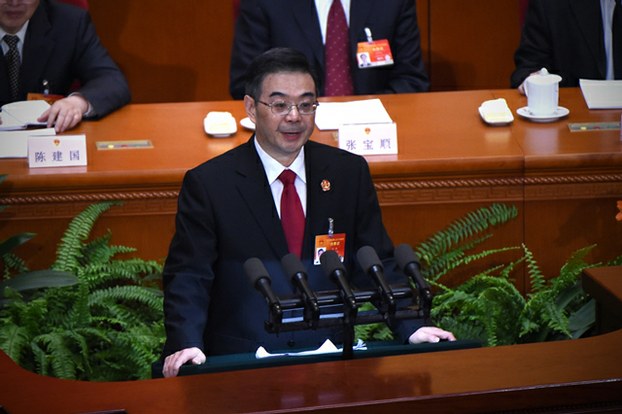China's judicial reforms won't shake Party hold on courts: Experts
| Publisher | Radio Free Asia |
| Publication Date | 31 March 2015 |
| Cite as | Radio Free Asia, China's judicial reforms won't shake Party hold on courts: Experts, 31 March 2015, available at: https://www.refworld.org/docid/552e199736.html [accessed 26 May 2023] |
| Disclaimer | This is not a UNHCR publication. UNHCR is not responsible for, nor does it necessarily endorse, its content. Any views expressed are solely those of the author or publisher and do not necessarily reflect those of UNHCR, the United Nations or its Member States. |
2015-03-31
 Zhou Qiang, president of the Supreme People's Court of China, delivers his work report to the National People's Congress at the Great Hall of the People in Beijing, March 12, 2015. AFP
Zhou Qiang, president of the Supreme People's Court of China, delivers his work report to the National People's Congress at the Great Hall of the People in Beijing, March 12, 2015. AFP
A decree from China's highest court banning officials from interference in court proceedings is unlikely to herald major changes soon, analysts said.
The Supreme People's Court in Beijing recently launched a set of reform guidelines in a bid to strengthen the rights of defendants and prevent official interference in court decisions, official media reported.
Among the reforms include the setting up of a system for recording officials' instructions, letters and other information that are judged to be "interfering" with legal cases.
According to the English-language Global Times newspaper, which has close ties to the ruling Chinese Communist Party, such records will be stored and litigants will be able to check them.
But a recent high-level judicial meeting stopped short of recommending "western-style" judicial independence or the separation of powers, the report said.
The new guidelines also set requirements for judges' experience and professionalism and promised to form mechanism for punishing judges who violate the rules, the paper said.
The Supreme People's Court reform plan sets out guidelines for the confirmation of evidence, the establishment of facts and for making fair judgments, it said.
In an apparent reference to the widespread use of forced confessions in China's legal system, courts should reject any evidence obtained through illegal means, the court will order.
Meanwhile, steps will be taken to improve the experience of defendants, who often appear in court in prison uniform with shaved heads.
But a top human rights lawyer said the rules will be hard to implement to a meaningful degree, as judicial officials are often required to wait for directions from their superiors in the government before passing judgment.
"The judiciary really has no say in deciding the more sensitive cases," visiting Harvard legal scholar Teng Biao told RFA in a recent interview.
"They are obliged to do as directed by the party's political and legal affairs committees, or other high-ranking officials," he said.
Tightening their holds
Teng said that governments at the central and provincial levels have actually tightened their holds on the judicial system in recent months.
"All of the officials, budget and management of China's judicial system are under the leadership of the political and legal affairs committees," Teng said.
"Under such circumstances, the courts can't take any action without relying on the local authorities at every level of government," he said.
Teng said the new rules are a bid to deal with the number of complaints that currently swamp China's courts and "letters and visits" petitioning system.
"It's an emergency measure to deal with all the complaints about miscarriages of justice, but it's not likely to work," he said.
China's "letters and visits" complaints system is flooded with some 22,000 new complaints daily across the country, according to government figures from 2013.
Petitioners have complained that the courts are increasingly refusing to take such cases, while new rules forbid them from seeking to complain to higher levels of government.
"This is an attempt to treat the symptoms, but it's not a cure," Teng said.
An important step forward
Sichuan-based rights activist Huang Qi, whose Tianwang website reports regularly on complaints and petitions against the government, said the move still represents an important step forward for the Chinese legal system.
"Currently, officials at any level of government can interfere at will using a number of methods with a court case, from investigation right up to trial and judgment," Huang said.
"This has given rise to huge numbers of complaints about miscarriages of justice in the past decade or more," he said.
"It has seriously damaged trust in the Chinese legal system."
Huang said his own two trials and prison sentences were the direct result of official interference in his case.
"Not only have we seen tens of thousands of similar case, but I myself have been a victim of the system," he said. "[Former security czar] Zhou Yongkang himself intervened in my 2002 trial, and afterwards."
Meanwhile, rights lawyer Chen Jiangang said that a clause in the Supreme Court's reform directive referring to party leadership made it ultimately impossible to achieve its goals.
"It mentions the upholding of party leadership and the maintenance of the correct political direction," Chen said in a recent interview. "The presence of that clause means that there will be no beneficial changes in the judicial system."
Professor Xia Ming, of New York's City University, said the new guidelines could be helpful to China's embattled legal profession, as they encourage professionalism in the judicial sphere.
"The police have always played a dominant role in the legal system, while the courts have always been under the domination of the public prosecution service, rather than being at the heart of the judicial process," Xia said.
"These guidelines put the judiciary at the heart of the investigative and indictment process, and will help to raise the status of the courts."
Reported by Shi Shan and Tang Qiwei for RFA's Mandarin Service. Translated and written in English by Luisetta Mudie.
Link to original story on RFA website
